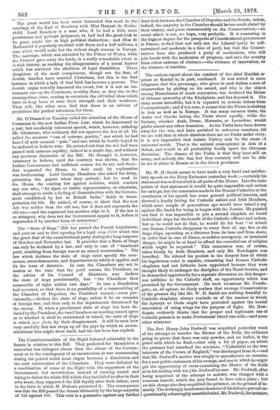Mr. O'Donnell on Tuesday called the attention of the House
of Commons to the new Indian Press Law, which he denounced in a just, but needlessly vehement speech, which, however, called up Mr. Gladstone, who evidently did not approve the Act at all. He called the measure "one of extreme gravity," one which he had heard of with unusual "pain," and one which he hardly hoped to be induced to believe wise. He pointed out that the Act had been passed with extreme rapidity, indeed in a single day, and without any previous discussion of the Bill. He thought it, however, necessary to believe, until the contrary was shown, that the Indian Government had sufficient reason for its act, and there- fore requested the House to wait until its explanation was forthcoming. Lord George Hamilton also asked for delay, promising the papers when they arrived ; but he read to the House the existing law against sedition, which renders any one who, "by signs, or visible representation, or otherwise, shall attempt to excite a feeling of dissatisfaction with the Govern- ment established by law in British India," liable to trans- portation for life. He wished, of course, to show that the new Act was milder than the old one, but it does not supersede the old one,—and the argument has another edge to it. If the law is so stringent, why does not the Government appeal to it, before it supersedes it by another form of restriction?


































 Previous page
Previous page